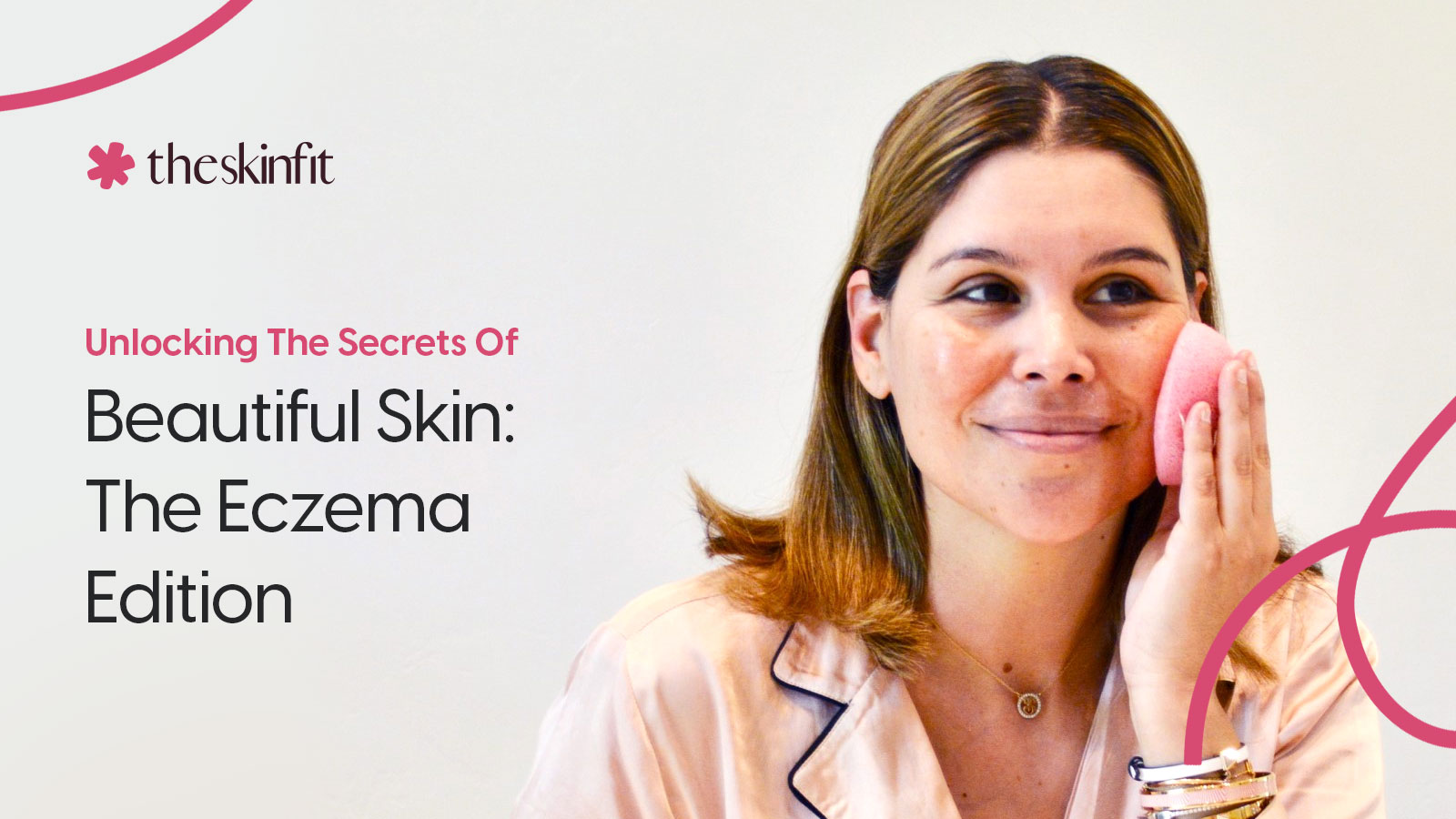Fear not, because we will solve the enigma of those annoying skin problems. In this post, we'll look at eczema, a widespread yet mysterious skin ailment that affects individuals of all ages.
Eczema is a common skin disorder that affects millions of people throughout the globe. It can lead to pain, irritation, and even lower self-esteem.
In this in-depth article, we will discuss what eczema is, its various types, the potential link between eczema and skin cancer, effective treatments such as eczema treatment creams in Pakistan, and essential tips for managing and preventing eczema flare-ups.
From identifying the underlying reasons to identifying successful treatments, we'll go on a journey together to beat eczema and recapture the soft, smooth skin you've always desired. So sit back, relax, and prepare to say goodbye to irritation and pain.
Prepare to enter a world of itch-free possibilities as we investigate the complexities of eczema and discover the ultimate answer for a happier, healthier you. Let's get started!
What is Eczema?
Eczema is a chronic inflammatory skin condition that causes red, itchy, and dry patches. Eczema is a term used to describe a group of symptoms, including skin redness, itchiness, and irritation. It's like having a persistent itch that won't go away!
It most often appears on your face, hands, elbows, or knees, although it may occur anywhere on your body. Eczema comes in several forms, with some suffering more severely than others.
The reasons behind eczema may not be entirely transparent, yet genetics and environmental factors will likely have an impact. Luckily, there are efficient techniques that can help you handle eczema and enhance your skin's appearance. Therefore, there's no need to worry!
Kinds of Eczema
Eczema comes in various forms, each with its own set of symptoms and causes. The following are the most common kinds of eczema:
- Atopic Dermatitis: If one has a family history of allergies, asthma, or hay fever, they are likely to develop the most common type of eczema, which can cause dry, itchy, and inflamed skin in the elbow, knee, and facial creases.
- Contact Dermatitis: This eczema develops when the skin is exposed to an irritant or allergen. It causes red, itchy, and sometimes blistering skin at the point of contact.
- Dyshidrotic Eczema mainly affects the palms, fingers, and foot soles. Small, itchy blisters that cause pain and suffering define it.
- Nummular Eczema: This condition is distinguished by circular or oval-shaped spots of red, itchy skin that leak and crust over. It most usually affects the limbs, legs, and chest.
- Seborrheic Dermatitis: Also known as "cradle cap" in babies, this eczema affects oil gland-rich regions of the scalp and face. It results in red, flaky, and sometimes oily areas of skin.
- Stasis Eczema: Stasis eczema affects the lower legs and is frequently associated with poor circulation and venous insufficiency. It causes puffy, itchy, discolored skin.
Each form of eczema has its treatment options, and it's critical to know which one you must manage adequately. If you have eczema, you should see a doctor for an accurate diagnosis and tailored treatment plan.
Causes of Eczema
The precise origins of eczema are unknown. However, it is considered a mix of hereditary and environmental factors. The following are some of the most critical elements that might lead to the development of eczema:
- Genetics: Family history impacts eczema. If you have a parent or sibling with eczema or another allergic disorder such as asthma or hay fever, you are more likely to get eczema.
- Immune Dysfunction: Eczema is often associated with an overactive immune response. The immune system may assault healthy skin cells by mistake, causing inflammation and discomfort.
- Skin Barrier Dysfunction: Eczema patients' natural skin barrier is disrupted. This permits moisture to leave while allowing allergens and irritants to infiltrate, causing eczema flare-ups.
- Environmental Triggers: Certain ecological factors might worsen eczema symptoms. Soaps, detergents, pollen, pet dander, mold, and specific textiles may all be triggers.
- Allergens: Allergens such as dust mites, pet dander, and pollen may aggravate eczema in those allergic to these things.
- Irritants: Exposure to irritants such as harsh chemicals, scents, and certain metals (such as nickel) may trigger eczema flare-ups in some people.
- Weather Changes: Eczema symptoms may be triggered or worsened by extreme temperatures, such as freezing and dry air in winter or hot and humid circumstances in the summer.
- Stress: In some people, emotional stress and worry may trigger eczema flare-ups. Stress management approaches are beneficial in the treatment of eczema.
It's essential to remember that eczema triggers differ from person to person, and recognizing and avoiding particular allergens may be vital in properly treating eczema.
Seeking medical guidance and engaging with a healthcare expert may also aid in developing a specific treatment plan for better management of eczema symptoms.
Are Eczema and Skin Cancer Linked?
Many people question whether having eczema increases their chances of acquiring skin cancer. While eczema does not cause skin cancer, the persistent inflammation and compromised skin barrier that eczema causes may raise the risk. Individuals suffering from eczema must protect their skin from excessive sun exposure and have frequent skin checks with a dermatologist.
Eczema Treatment Cream in Pakistan: Natural Remedies and Solutions
Many therapy options are available for people seeking effective eczema relief. Eczema treatment creams have grown in popularity in Pakistan owing to their ease of use and possible benefits.
Understanding Moisturization's Importance
Moisturizing the skin is essential to treating eczema. Regularly applying a moderate, fragrance-free moisturizer helps keep skin hydrated, decreasing dryness and irritation.
Topical Steroids: A Treatment Option in Severe Cases
A dermatologist may prescribe topical steroids in severe eczema situations. These drugs aid in the reduction of inflammation and the alleviation of symptoms. It's important to take them under medical supervision and for a limited time to avoid harmful effects.
The Benefits of Anti-Itch Creams
Itching is a typical and aggravating symptom of eczema. Itching may be relieved temporarily using anti-itch lotions containing substances such as hydrocortisone or colloidal oatmeal.
Changes in Lifestyle to Treat Eczema
Specific lifestyle changes might significantly influence eczema management. Some tactics that may help include avoiding hot baths, wearing soft textiles, and practicing stress-relief techniques.
How to Treat Eczema: How to Avoid Flare-Ups
Prevention of flare-ups is an integral part of eczema management and treating existing symptoms.
- Identifying and Avoiding Triggers
Identifying and avoiding causes aggravating eczema symptoms may help significantly. Certain textiles, pet dander, pollen, and stress are common causes.
- Maintaining a Healthy Diet
Stress might make eczema symptoms worse. Relaxation practices such as yoga or meditation help manage stress and positively influence the skin.
- Children's Eczema: Special Considerations
Eczema is prevalent in children, and parents must take extra precautions to control the disease. Children with eczema must keep their skin hydrated, use moderate skincare products, and eat a nutritious diet.
Eczema Natural Remedies: A Holistic Approach
Several natural solutions may supplement conventional eczema treatments, offering extra relief and boosting skin health.
- Aloe Vera Gel: Nature's Soothing Agent
The natural anti-inflammatory qualities of aloe vera gel help soothe inflamed skin and decrease redness and irritation.
- Coconut Oil: Nourishing and Hydrating the Skin
Coconut oil is a natural emollient that hydrates and nourishes dry, eczema-prone skin.
- Oatmeal Baths: Relieving Itchy Sensations
Oatmeal baths may relieve itching and irritation, making them an ideal treatment for eczema symptoms.
- Chamomile Tea has anti-inflammatory properties.
Chamomile tea applied topically or consumed as a herbal infusion may help decrease inflammation and aid skin healing.
- Stress Reduction Techniques
Meditation, yoga, and deep breathing are all ways to deal with mental stress, which can cause eczema flare-ups.
The holistic method considers that each case of eczema is distinct, with its own set of causes and responses to treatment. It encourages people to collaborate closely with healthcare experts, such as dermatologists or naturopaths, to develop a tailored and balanced treatment plan that suits their eczema's unique requirements. Long-term comfort and improved quality of life for those with eczema may be achieved by adopting a holistic approach to treatment.
Myths About Eczema, Exposed
Various myths concerning eczema need to be dispelled.
- Eczema spreads easily.
Direct touch cannot spread eczema from person to person because it is not contagious.
- Eczema is a condition that only affects children.
Eczema may last into adulthood, impacting people for the rest of their lives.
- Poor Hygiene Causes Eczema
Inadequate hygiene is not the primary cause of eczema; instead, a combination of factors, including genetics, immune system dysfunction, and environmental triggers.
The Importance of Diet in Treating Eczema
Diet is essential in controlling eczema symptoms. Certain foods might cause flare-ups, while others can help relieve symptoms.
- Foods to Avoid
Individuals suffering from eczema should avoid allergen-rich foods such as nuts, dairy, and gluten.
- Foods to Incorporate
Foods, including anti-inflammatory foods such as leafy greens, fatty salmon, and probiotics, may help control eczema.
How to Choose Eczema-Friendly Skincare Products
Eczema-friendly skincare products are carefully designed to meet the requirements of people with eczema or other sensitive skin disorders. These solutions are intended to reduce possible irritants and allergens that might cause or aggravate eczema symptoms while also delivering a pleasant and relaxing experience for the skin.
This guide aims to enable people with eczema to make educated skincare decisions. It teaches students what components to seek and what to avoid in skincare products to avoid skin reactions.
Here are a few examples of what the guide may cover:
- Irritating compounds: The guide may list common compounds irritating sensitive skin, such as perfumes, parabens, sulfates, and some preservatives. Individuals may avoid goods that aggravate their eczema by learning what to avoid.
- Choosing Hypoallergenic Goods: Hypoallergenic goods are designed to reduce the likelihood of allergic responses. The guide may suggest shopping for hypoallergenic products to lessen skin discomfort.
- Choosing Fragrance-Free Products: Fragrances are a typical eczema trigger. The advice may urge people to use fragrance-free skincare products to reduce the risk of irritation.
- Moisturization and Hydration: Hydrated skin is critical for eczema management. The guidance may stress the necessity of selecting moisturizing products that assist in maintaining moisture while also protecting the skin's natural barrier.
- Skin Patch Testing: Before using a new product, the handbook may advise you to do a patch test. This is applying a small quantity of the substance to a small skin area to test for any negative responses before applying it to a broader region.
- Seeking Professional Advice: While the guide may be helpful, it may also emphasize the significance of visiting a dermatologist or skincare professional for customized advice based on particular skin requirements and sensitivities.
Conclusion
Eczema is a complicated skin disorder that affects many people. Understanding its origins, triggers, and available treatment choices is critical for properly managing and avoiding flare-ups. Individuals suffering from eczema may live more comfortably by adopting natural therapies, lifestyle changes, expert medical treatment, and, more importantly, using good skincare products readily available on Theskinfit.com.
Frequently Asked Questions (FAQs)
1. Is eczema completely curable?
Unfortunately, no treatment exists for eczema. However, with correct management and therapy, symptoms may be successfully managed.
2. Is using eczema treatment creams without a prescription in Pakistan safe?
Mild eczema creams you can buy over the counter are usually safe for short-term use. For severe cases, it is best to see a medical professional.
3. Can stress cause an eczema flare-up?
Yes, stress may precipitate eczema flare-ups. Stress-relief practices help decrease the effects on the skin.
4. Can natural therapies be used to treat eczema?
Natural therapies are a helpful addition to traditional treatments. Their efficacy, however, may differ from person to person.
5. Can children grow out of eczema?
While some children grow out of eczema, others may suffer symptoms into adulthood. Proper treatment is essential for all eczema patients.
So, what are you waiting for? Explore TheSkinFit Pakistan's leading online cosmetics and beauty store.


